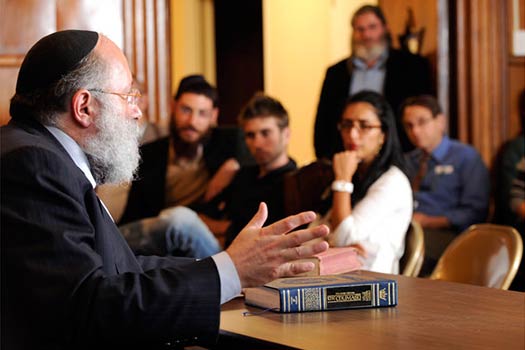
8:00pm: Female Judges in the Essay Contest
This week’s edition of MyLife: Chassidus Applied with Rabbi Simon Jacobson, Episode 103, will air tonight, Sunday, here on CrownHeights.info, beginning at 8:00pm. This week Rabbi Jacobson will address the topics: Female Judges in the Essay Contest; Self-Esteem; Lying; Criticizing Children Constructively; Reward and Punishment; Pleasure from Other’s Misfortunes.
MyLife MP3s are available to download from the Meaningful Life Center Shop. Become a free member today and receive unlimited Mylife MP3 downloads.
We all have beautiful characteristics as well as some that are not so nice. One of the main objectives of Chassidus is to change the nature of one’s attributes, and even the very nature of one’s actual character. As such, MyLife: Chassidus Applied has addressed and continues to address how Chassidus helps us refine our characters, both in bringing out the best in us, and also dealing with our less pleasant personalities, like arrogance, anger, despondence, envy, judgmentalism, indolence, apathy and self-indulgence.
This week’s episode will address the ugly feature of not farginen someone in their success. “Nisht farginen” is a Yiddish expression which loosely means not to afford someone the pleasure of their accomplishment, a variation of schadenfreude, a sadistic condition in which a person derives pleasure from the pain or misfortune of others. Why would someone be troubled by the achievements of another, especially if the person (the nisht farginer) did not lose anything in the process? How do we overcome these type of feelings?
Another distasteful characteristic is deceit: the tendency to lie. How does Chassidus advise us to deal with lying and duplicity?
Other topics that will be discussed this week include more about childhood challenges and parenting:
- “Should I share with my teenage son information about his personality and how others view him in order to help him grow and refine himself, or will this type of feedback be destructive — especially since he is very defensive?”
- Are there any circumstances which warrant us giving up on our child? The parsha of ben sorer u’moreh seems to suggest a hopeless child. Is that applicable?
- “After growing up in a home of tough love and few words, I wonder: can self-esteem, unconditional love and acceptance of self can be self-acquired later in life?”
With two weeks left in this year’s MyLife: Essay Contest, Rabbi Jacobson will discuss some questions that have come in about essay submissions and the hotly debated topic of female judges, as well as the topic of reward and punishment according to Torah.
Rabbi Jacobson will also review the following essays submitted in last year’s MyLife: Chassidus Applied essay contest: “Prozac Nation?” byDevorah Leah Bogart, “Unconditional Unity” by Hinda Bluma Sheinberger, and “When to Address Personal Shortcomings” by Ronit Leah Studnitz. These and other essays can be read online at meaningfullife.com/essays.
And finally, the Chassidus question of the week: In chapter six, Tanya introduces the ten faculties of the Nefesh HaBahamis (the animal soul), that are parallel to the ten faculties of the Nefesh HaElokis (the divine soul). I have several questions about this: 1) Why are they called crowns of impurity (kisrin d’mesavuso)? 2) What is the difference between the chachma, bina and daas of the Nefesh Elokis and those of the Nefesh Bahemis? We can understand the difference between the middos (emotions) of the two souls — one is emotionally drawn to G-dliness and holiness and the other to self-interest and self-preservation, which is why the (seven) middos are called “doubles” (as cited earlier in chapter 3). But what is the essential distinction between a spark of intellect from the divine soul’s intellect and that of the animal’s soul’s intellect? And what would be an even habochen (a litmus test) to know how to distinguish between them?
This hour-long dose of insights is meant to inform, inspire and empower us by applying the teachings of Chassidus to help us face practical and emotional challenges and difficulties in our personal lives and relationships. To have your question addressed, please submit it atmeaningfullife.com/mylife.
The topics in this Sunday’s hour-long broadcast will include:
- Chassidus applied to Tetzaveh
- Nisht farginen: Not affording another the pleasure of success, and schadenfreude
- Ben Sorer U’moreh: Giving up on a child?
- How to grow through abuse: acquiring self-esteem, unconditional love and acceptance after a dysfunctional childhood
- Will honest critique help or harm a child?
- Reward and punishment: Why would G-d want to hurt us?
- Chassidus Question: What is the difference between Chaba”d of the divine soul and the animal soul?
- MyLife Essays: Prozac Nation, Unconditional Unity, When to Address Personal Shortcomings
MyLife: Chassidus Applied addresses questions that many people are afraid to ask and others are afraid to answer. When asked about the sensitive topics he has been addressing, Rabbi Simon Jacobson commented, “I understand that the stakes are high and great care has to be taken when speaking openly, but the silence and lack of clarity on matters plaguing the community can no longer go unaddressed. The stakes of not providing answers are even higher.”
The on-going series has provoked a significant reaction from the community, with thousands of people viewing each live broadcast and hundreds of questions pouring in week after week. At the root of every question and personal challenge tackled by the series is the overarching question: Does Judaism have the answers to my personal dilemmas?
In inimitable “Jacobson-fashion”, the broadcast answers people’s questions in simple, clear language while being heavily sourced. Each episode is jam-packed with eye-opening advice from the Rebbeim, gleaned from uncovering surprising gems in their letters, sichos and maamorim that address our personal issues with disarming relevance. Simultaneously, Rabbi Jacobson is able to crystallize a concept quickly, succinctly, and poignantly for any level of listener.
All episodes are immediately available for viewing in the MLC’s archive and can be downloaded as MP3s for listening on the go.
Questions may be submitted anonymously at meaningfullife.com/mylife.













